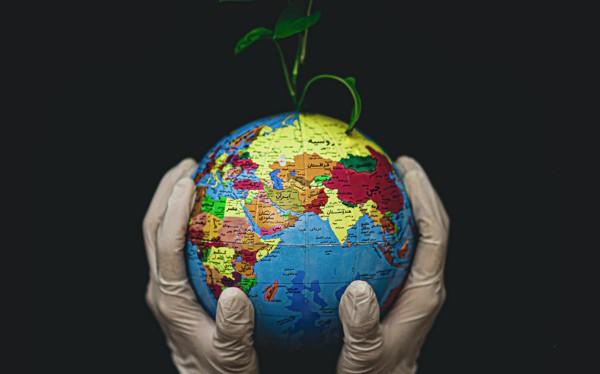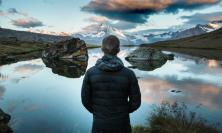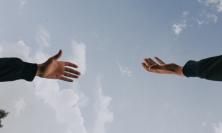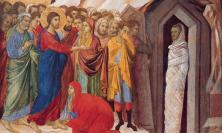In an interview with Avvenire to mark Laudato si’ week (16-24 May 2020), Cardinal Michael Czerny SJ urges us to let the encyclical shape the way we think about the coronavirus crisis and find solutions to the fault lines it is highlighting. ‘Before being a “socio-environmental issue”, creation is a fundamental article of faith’, so how can a Christian view and love of the world, our common home, inspire change?
This Laudato si’ week, celebrating the encyclical’s fifth anniversary, takes place at a dramatic moment, amid the Covid-19 pandemic. What particular meaning does the encyclical have in light of this situation, this ‘sign of the times’?
Five years ago, Laudato si’ revealed the fault lines of human injustice and environmental degradation. Covid-19 is amplifying and magnifying those same fault lines in a tragically concrete, dramatic and vivid manner. It’s exposing the ‘rapidification’ that Pope Francis identified (Laudato si’ §18): not only the manner and speed of the virus’s spread, but also the highly accelerated digitalisation underway, the millions of conventional jobs being lost, the online communication replacing meetings and changing events.
Note the parallels: the coronavirus crisis starts by damaging physical health, but it has terrible socio-economic consequences, especially among the most vulnerable. The ecological crisis is similar: it starts with environmental damage, but has devastating consequences for work, food, health and other social issues, hitting the poorest, hardest. Both crises require novel solutions that apply everywhere and at all levels, not just for and at ‘the top’.
Laudato si' was not the first time that the Church spoke of ecology, but thanks to the encyclical a new paradigm of integral ecology was established, which also had an effect on both ecclesial and common language. What processes did the encyclical initiate?
Soon after it came out, Laudato si’ helped to ground, animate and orient the Paris COP21 Conference in December 2015, which produced the Paris Agreement – flawed and weak, but still a first necessary step. It has also stimulated many forms of activism in parishes, other religions, secular groups and movements. I believe that this is unprecedented for an encyclical.
How can we re-read Laudato si’ in today’s light? And how can we get the most out of this Laudato si’ week?
It is valid to read Laudato si’ in the light of Covid-19. Environmental abuse and degradation probably contributed to the emergence and spread of the virus, but our understanding must go much deeper to the fundamental anti-values that fuelled the competitive and consumerist civilisation of yesterday. The new world after Covid-19 has to be much better.
There are still some Catholics who have some difficulty in considering the socio-environmental issue as a fundamental part of their faith. What can you say to them?
Before being a ‘socio-environmental issue’, creation is a fundamental article of faith: ‘I believe in God, the Father Almighty, Creator of heaven and earth’.
Human life is grounded in three fundamental and intertwined relationships: with God, with our neighbour and with the earth itself, the earth being part of God’s loving creation. To distort any of those relationships is to sin. Forgiveness is to seek participation in the redemption Christ brings us, the healing of broken relationships and the restoration of the three-fold harmony.
Pope St John Paul II reminds everyone, especially Christians, ‘that their responsibility within creation and their duty towards nature and the Creator are an essential part of their faith’.[i] So, with the Catholics you mention, let’s walk together and together face our disbelief, our fear.
Querida Amazonia and the whole synodal process are children of Laudato si'. In what way does Querida Amazonia draw on Laudato si’ and question us all, not only the Amazon people?
The Amazon Synod showed what it means to take Laudato si’ seriously, to address all the social and ecological sins in a given region aggressively and bravely. That’s a lesson that needs to be followed everywhere on earth.
In addition, Querida Amazonia unabashedly respects and validates the people of the Amazon – especially the indigenous ones – as the first and indispensable protagonists in preserving the Amazon to play its planetary role. This challenges all who continue to harbour (albeit unconsciously) lingering colonialist attitudes towards other cultures or a sense of entitlement over all natural resources.
How might Laudato si’ help us in a post-pandemic rebuilding?
First, let’s be clear – our objective should not be to go back to ‘business as usual’, reverting to the self-destructive, inhumane, unjust and unsustainable practices that used to be ‘normal’ until early 2020.
Instead, Pope Francis says, let us regenerate new relationships, a new economy, a new society. Laudato si’ challenges the core drivers of unhealthy and destructive growth, proposing instead an inclusive, sustainable development that deserves the name ‘integral’.
As for how to go about it, Laudato si’ gave enormous attention to dialogue as the utterly necessary foundation of positive action. The only approach to post-pandemic regeneration is dialogue, which means honestly involving all those who are concerned. This is the synodal way.
Young people are perhaps the ones who feel most affected by the environmental crisis. Can integral ecology work as a bridge to communicate with those who find it more difficult to integrate with traditional parish or church structures?
Young people are right to feel totally outraged by the flagrant irresponsibility of all ‘those responsible’. These are not only decision-makers in commerce and politics, but also consumers and citizens who live a lifestyle based on the unsustainable exploitation of both people and the planet.
Young people now see the planet as their essential locus of reverence and concern; as Christian movements and parishes accompany them in their quest, young people take part and indeed play leading roles. This we learned at the 2018 Synod on Young People.
The environmental crisis is getting worse every day; it is certainly even more serious now than it was five years ago, when Laudato si’ was published. What commitment should a Christian make this week?
First, everyone, Christians and others, can try to improve our relationship with nature via the path of contemplation. We cannot love what we don’t even see; contemplative seeing can launch the journey of ecological conversion.
During the coronavirus pandemic, many are discovering that we can live on less. So we can continue consuming less, or choosing less-polluting products, or avoiding unnecessary, non-recyclable packaging. Instead of shopping without thinking about the moral and environmental consequences, our Catholic parishes, schools and centres can accept that ‘purchasing is always a moral – and not simply economic – act’ (Laudato si’ §206, quoting Caritas in Veritate). They can use glass bottles and washable dishes, as many social centres and popular movements habitually do.
Finally, in our liturgy, let us commit to celebrate God’s gift of creation in a more inspiring way. Our traditional liturgies include elements of nature: water and oil in baptism, bread and wine in the Eucharist, fire at the Easter Vigil. We need to experience nature in us spiritually, and ourselves in creation, in an integral manner. Otherwise we just continue exploiting, consuming and abusing nature, rather than accepting our responsibility as co-creators with God of our common home. The frugal, liturgical and contemplative dimensions of Christian spirituality will help motivate the necessary personal, social and systemic changes – all radical ones!
Can you mention some initiatives particularly inspired by Laudato si’?
The Global Catholic Climate Movement (GCCM), also celebrating its fifth anniversary, has more than 900 Catholic member organisations from large international networks and religious congregations to local parishes, grassroots leaders, and thousands of Catholic men, women and young people. GCCM helped to organise the wonderful Laudato si’ week we are celebrating right now.[ii]
Other examples include local organic farming in Latin America, buildings refitted ecologically in Europe, and solar energy installed in Africa. A number of Catholic schools have taken Laudato si’ as their primary interdisciplinary teaching theme to promote ecological responsibility and to mobilise students and their families in caring for our common home.
Cardinal Michael Czerny SJ is Under-Secretary of the Migrants and Refugees Section of the Dicastery for Promoting Integral Human Development.
This is a translation of an interview conducted by Lucia Capuzzi and Stefania Falasca for Avvenire.
[i] John Paul II, Message for World Day of Peace 1990, §15.
[ii] Pope Francis’s Invitation to Laudato si’ week, in English: https://www.instagram.com/p/CAQBz7HIGzj/?hl=en; in Italian: https://youtu.be/uFQAB2vuaQw






